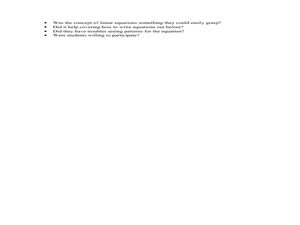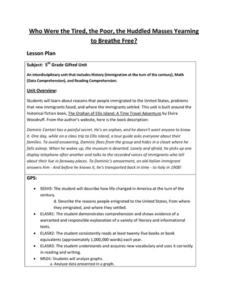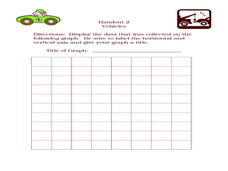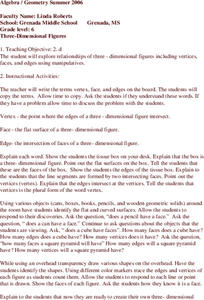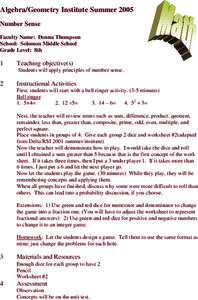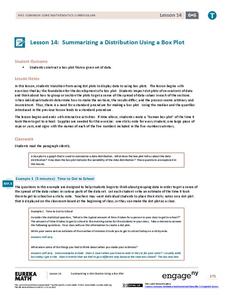Curated OER
Addition and Subtraction in Center Time
First graders use bean bags, dominos, number trains, counters, paper clips, flashcards, beads and more in a variety of centers to practice basic addition and subtraction facts.
Curated OER
"Math Curse" by Jon Scieszka
Students practice estimation skills for measurement, and work with metric units of measurement.
Curated OER
Hot Time in the Classroom
Fourth graders, in groups, examine how temperature is a measure of the average translational kinetic energy.
Curated OER
Math - Divisibility
Middle schoolers explore the concept of divisibility. In this divisibility lesson, students determine which numbers are divisible by another number.
Curated OER
Math-Addition
Second graders practice adding numbers that add up to less than 100. In this addition lesson, 2nd graders use candy to practice adding after participating in a demonstration lesson. They complete a worksheet, and an assessment.
Curated OER
FOOTSTEPS IN TIME
Students measure and correlate their foot lengths and body heights, then use this data to estimate height of Laetoli hominids. They use metric measurement and graphing to determine these heights.
Curated OER
Prime Time
Seventh graders practice determining the prime factorization of composite numbers. They create Christmas factor trees for prime numbers greater than 100. They decorate their final products with markers, crayons, colored pencils, glitter...
Curated OER
Math in Society
Twelfth graders determine probabilities of real-life events such as life expectancies, winning a lottery ticket and the break-even premium. They apply how life-expectation tables are used to estimate the probability that an individual...
Curated OER
Every Graph Tells A Story
Seventh graders explore linear equations. In this graphing lesson, 7th graders explore constant rates of change. Students discover the real-life application of graphs and demonstrate their ability to read graphs and write...
Northeast Georgia Regional Educational Service Agency
Who Were the Tired, the Poor, the Huddled Masses Yearning to Breathe Free?
Elvira Woodruff's The Orphan of Ellis Island: A Time Travel Adventure is the core text in a interdisciplinary unit study of immigration at the turn of the century.
Environmental Protection Agency (EPA)
How Much Water Do You Use?
Incorporate reading strategies, math, research, and the scientific method into one lesson plan about water conservation. After reading a story about a landlady trying to determine how many people are living in an apartment, learners...
Curated OER
Show Me The Data!
Pupils create a bar graph. They will collect and organize data to turn into bar graphs. They create graphs for the favorite sports of the class, color of M&M's, and types of cars passing by.
Curated OER
Three-Dimensional Figures
Sixth graders explore three-dimensional objects. Using various objects found in the classroom, they identify faces, edges, and vertices of objects. Students create their own objects. They describe the polydron, telling the faces,...
EngageNY
Comparison Shopping—Unit Price and Related Measurement Conversions II
Which rate is greater and by how much? Pupils continue to compare rates to solve problems in the 20th portion of a 29-part series. Rates are presented in a variety of representations either using the same representation or different...
Curated OER
Estimation Zone
Students explore estimation. They estimate distance, weight, temperature and elapsed time. Students record their estimates and justify their estimations wtih a written response. After estimating, students take the actual measurements of...
Curated OER
Number Sense
Eighth graders participate in a lesson that is concerned with reviewing basic math concepts using the four operations. The activity is composed of a math game that is played by them.
Curated OER
Monstrous Data
Students examine the meaning of data and data collection, represent data in various ways, and make a bar graph.
Curated OER
Probability
Fifth graders participate in a instructional activity that is concerned with the mastery of math concepts related to probability. They play a math game that is an adaptation from Rock, Paper, and Scissors.
Curated OER
Dividing By 2 and 5
Third graders divide by 2 and 5. In this math lesson, 3rd graders label the parts of a division sentence. Students solve division sentences using multiplication.
EngageNY
Chance Experiments
Class members are introduced to probability using terms such as impossible, unlikely, likely, and certain. Numbers between zero and one are associated with the descriptions of probability. Pupils find the likelihood of chance experiments...
EngageNY
Summarizing a Distribution Using a Box Plot
Place the data in a box. Pupils experiment with placing dividers within a data set and discover a need for a systematic method to group the data. The 14th lesson in a series of 22 outlines the procedure for making a box plot based...
Houghton Mifflin Harcourt
Developing the Concept: Multiplying and Dividing with Negative Integers
Show your math class strategy charts that will help them solve multiplication and division problems using both positive and negative integers. This resource gives you questions to ask as you guide learners through the concepts. Have them...
Federal Reserve Bank
Less Than Zero
Perry the penguin wants to buy a new scooter, but he doesn't have any funds! Walk your kids through the short book Less Than Zero, and have them track his borrowing, spending, and saving on a line graph while you read. Pupils will learn...
EngageNY
Ratios II
Pupils continue the study of ratios by creating ratios from a context. The contexts present more than two quantities, and scholars create contexts that match given ratios.
Other popular searches
- Esl Math Telling Time
- Esol Math Telling Time
- Math Telling Time Worksheets
- Math Telling Time Activities
- Telling Time Math










